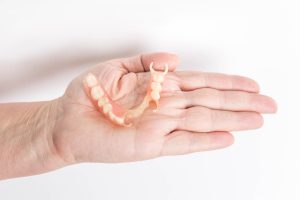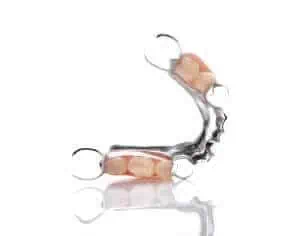Are you missing teeth and interested in replacing them with a Valplast denture? These dentures are the most well-known and popular flexible dentures available, but are they the right option for you?
If you’re missing teeth there are a lot of different solutions for replacing them, all with their advantages and disadvantages. Dentures are one of the more affordable options, but they don’t always have a good reputation. Traditional dentures in particular are usually associated with being ill-fitting and uncomfortable.
The truth is that no matter how well your dentures fit at first, they may not stay that way because your face and jaw are liable to change shape over time. Flexible dentures like Valplast, on the other hand, are flexible and can adapt and change shape with your mouth.
This article will go in-depth and discuss everything you need to know about them, including:
- What is a Valplast denture?
- How much do they cost?
- Are they available on the NHS?
- Valplast dentures disadvantages and advantages
- What do Valplast reviews say?
Let’s jump right in so you can get those missing teeth replaced!
In This Article
What is a Valplast denture?

Valplast is a brand of removable flexible partial dentures. They are made from a nylon resin that is not only durable but flexible enough to move and adapt with your mouth.
This makes them a lot more comfortable to wear than dentures that are made from hard unmoving material. However, it does mean that you cannot get Valplast full dentures, as full mouth dentures require some rigidity to stay in place.
Unlike other types of partial dentures, they don’t have uncomfortable metal clasps to keep them in place, which can be visible at times. Instead, they have little projections made from the same nylon resin material that fit over the teeth and gums to help the denture stay in place.
Valplast dentures match your natural teeth and gums better than traditional dentures, although they may be prone to discolouration over time.
Overall, Valplast dentures could be a better choice for you if you are looking to replace one or more teeth. They are strong, lightweight and, aesthetically speaking, blend in well with your remaining natural teeth.

What is the process for getting a Valpast denture?
If you are interested in getting a Valplast partial denture the process is simple. The first step is to search for ‘Valplast dentist near me’ or ‘Valplast dentures near me’.
Then, book a consultation so the dentist can evaluate your teeth and mouth to see if they would be right for you. Once a decision has been made, your denture will be custom made for you without any changes to your natural teeth.
How much does a Valplast denture cost in the UK?
The cost of a Valplast denture in the UK is more affordable than some of the other ways to replace missing teeth. However, due to the materials used they are more expensive than traditional dentures.
They cost on average between £400 to £600 per arch, but every practice is different and prices can range between dentists. Some practices charge up to £1000 per arch, so you could pay up to £2000 if you need dentures for both your upper and lower teeth.
Can you get Valplast dentures on the NHS?
You are able to get both acrylic and metal dentures on the NHS, but rarely flexible dentures. This is because the materials to make acrylic or metal dentures are much more affordable. On some occasions, if medically necessary, you may be able to get Valpast dentures on the NHS, but this is uncommon.
If you want to get Valplast dentures you will have to opt for private treatment. But, if the price seems out of reach, you can always check for payment plans, or look into dental financing.
Advantages and disadvantages of a Valplast denture
While Valplast flexible dentures have their advantages over traditional dentures and more expensive procedures like dental implants and crowns, they have their disadvantages as well.

Advantages
- The thinner lightweight flexible material is more comfortable to wear
- Blend in well with your natural teeth and gums
- The flexible material moves with your mouth and adapts to your mouth as it changes shape over time
- Less likely to stain
- Non-allergenic, monomer, and formaldehyde-free
- Good for those with limited mouth opening
Disadvantages
- They are not permanent, and therefore not suitable for those looking for a long-term solution
- It is not possible to get them relined if they no longer fit
- They cannot easily be repaired if they break
- May feel bulkier than other partial dentures
- Valplast dentures can take longer to create in the lab
- Might suffer colour degradation with time
- Strict dental hygiene needed
What are common Valplast partial dentures problems?
Valplast partial dentures may be a preferable option to traditional partials, but they do have their problems.
As mentioned above, in the disadvantages, if you break your Valpast denture it usually cannot be fixed. So, be careful with it and make sure you put it in a safe place when you’re not wearing it. It’s also not possible to get a denture reline with a Valplast denture, due to the type of material it’s made from.
If you find your partial has rough edges that are causing you irritation or even ulcers, you can get your denture edges smoothed out so they are more comfortable. You may also feel slight discomfort or irritation while you are getting used to wearing your partial, and it can take longer to get used to a Valplast denture compared to traditional partials.
Discolouration over time can also be a problem as it may mean you have to get your denture replaced sooner than you think.
Other Valplast partial dentures problems can occur from not cleaning your denture correctly every day, according to the NHS, like bad breath, good disease, tooth decay and oral thrush. So, make sure you know the right way to care for and clean your dentures and make sure you maintain strict oral hygiene to avoid issues.
Valplast dentures vs traditional dentures
As we have touched on the differences between Valplast dentures and traditional dentures quite a bit, here is a table to summarise the differences between them:
Traditional dentures | Valplast flexible dentures | |
Material | Metal and/or hard acrylic plastic | Thermoplastic resin, e.g. nylon |
Full or partial? | Full mouth, partial and single tooth | Partial or single tooth |
Advantages |
|
|
Disadvantages |
|
|
Valplast Denture reviews
The first review is from a dental hygienist who talks about the benefit of having a flexible partial denture over traditional types. Michelle explains how much less adjusting you need with a flexible denture as you will custom fit itself to your mouth.
This means much fewer visits with the dentist to get adjustments. Michelle also explains that flexible dentures are a lot more comfortable to wear and you don’t get as many sore spots.
The next review is from a woman that has a partial Valplast denture. She reviews her experience with her flexible dentures, and her overall opinion is that they are much more comfortable than her old regular partial denture.
Then she shows us her denture and explains that is definitely not fragile, and yet still flexible. She also shows her Valplast partial before and after clips in the video.
Conclusion
Valplast dentures are flexible partial dentures that are an affordable solution for missing teeth. The material that they are made from is thin, durable and flexible and allows the denture to move and adapt to your mouth as it changes over time.
They are much more comfortable than traditional dentures, but they cannot be relined or fixed if they no longer fit, or if they break. Although they blend in well with your natural teeth and gums, they are prone to discolouration over time. Valplast dentures are more expensive than traditional dentures, and it is very rare to get them on the NHS.
These dentures are, however, much more affordable than other more permanent solutions such as dental implants or crowns. If you are still concerned about the cost you can look into dental financing or payment plans with your dentist.
IOSR Journal of Dental and Medical Sciences: A Review: Flexible Removable Partial Dentures. Consulted 25th November 2021.
NHS. Dentures (false teeth). Consulted 25th November 2021.
ResearchGate. Flexible Dentures in Prosthodontics -An overview. Consulted 25th November 2021.




